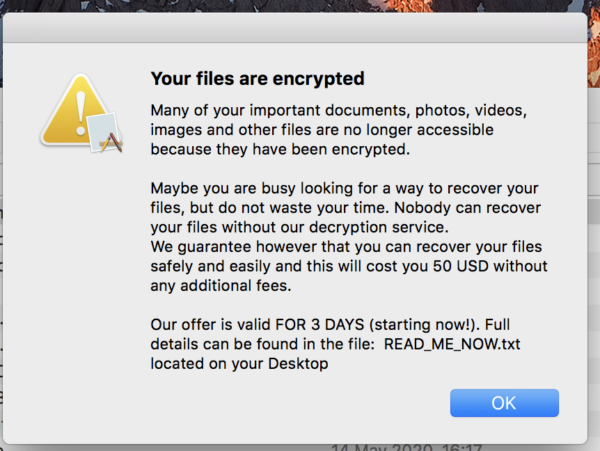Researchers at endpoint security company SentinelOne have created a tool that enables users to recover files encrypted by the Mac malware named ThiefQuest, which poses as ransomware.
ThiefQuest, initially named EvilQuest, is designed to encrypt files on compromised systems, but also allows its operators to log keystrokes, steal files, and take full control of the infected device.
ThiefQuest was initially classified as ransomware, but a closer analysis revealed that there was no way for the attackers to know which victims paid the ransom, which led researchers to believe that the ransomware features are meant to disguise the data theft activities.
ThiefQuest is delivered as trojanized installers for macOS applications such as the Ableton and Mixed in Key DJ apps and the Little Snitch firewall. Once the malware has been installed, it starts encrypting files found on the device, after which it informs victims, via text files and a modal window, that their files have been encrypted and a $50 ransom needs to be paid in bitcoin to recover them.

However, as Bleeping Computer pointed out, the same bitcoin address is provided to all victims and there is no way for the victims to get in touch with the attackers to let them know that the ransom has been paid.
Furthermore, Apple security expert Patrick Wardle noticed that the decryption routine is not called anywhere in the malware code, which indicates that it never gets executed. Malwarebytes researchers pointed out that the malware doesn’t always encrypt files, even if it claims it has done so, which further indicates that the ransomware capabilities are just a distraction.
For Mac users whose files have been encrypted by the malware, SentinelOne has released a free decryption tool. The company’s researchers analyzed ThiefQuest and noticed that its developer left the decryption function in the malware code. Once they were able to recover the key needed to decrypt the files, they used the malware’s own decryption function to restore encrypted files.
ThiefQuest is designed to steal documents, images, source code, databases, encryption keys and cryptocurrency wallets from infected systems.
Wardle’s analysis of the threat revealed that it also looks for executable files and adds malicious code to those files. This would allow it to spread like a virus, which is highly uncommon for Mac malware.
“The reality is most (all?) recent macOS malware specimens are not computer viruses (by the standard definition), as they don’t seek to locally replicate themselves. However OSX.EvilQuest does …making it a true macOS computer virus!!” Wardle said.
Related: Mac Malware Delivered via Firefox Exploits Analyzed
Related: Repurposing Mac Malware Not Difficult, Researcher Shows
Related: Mac Malware Poses as Trading App















